Food chains are very important for the survival of most species. When only one element is removed from the food chain it can result in extinction of a species in some cases. The foundation of the food chain consists of primary producers
Primary producers, or autotrophs, can use either solar energy or chemical energy to create complex organic compounds, whereas species at higher trophic levels cannot and so must consume producers or other life that itself consumes producers. Because the sun's light is necessary for photosynthesis, most life could not exist if the sun disappeared. Even so, it has recently been discovered that there are some forms of life, chemotrophs, that appear to gain all their metabolic energy from chemosythesis driven by hydrothermal vents, thus showing that some life may not require solar energy to thrive.
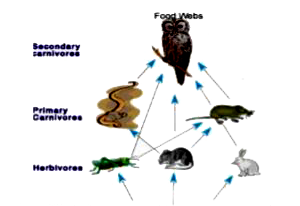
If 10,000 J solar energy falls on green plants in a terrestrial ecosystem, what percentage of solar energy will be converted into food energy?
10,000 J
100 J
1000 J
It will depend on the type of the terrestrial plant.
The correct Answer is:B
As we know, only 1% of energy of sunlight that falls on leaves is converted into food energy by plants. So, of 10,000 J is the energy of the sunlight, then (1/100) × 10,000 = 100 J of energy will be converted into food energy.
Topper's Solved these Questions
- OUR ENVIRONMENTBOOK - OSWAL PUBLICATIONCHAPTER - OUR ENVIRONMENTEXERCISE - SELF ASSESSMENT - 1 (OBJECTIVE TYPE QUESTIONS (MULITIPLE CHOICE QUESTIONS))
3 Videos
- OUR ENVIRONMENTBOOK - OSWAL PUBLICATIONCHAPTER - OUR ENVIRONMENTEXERCISE - SELF ASSESSMENT - 1 (OBJECTIVE TYPE QUESTIONS (PASSAGE/ DIAGRAM BASED QUESTIONS)
4 Videos
- OUR ENVIRONMENTBOOK - OSWAL PUBLICATIONCHAPTER - OUR ENVIRONMENTEXERCISE - ASSERTION AND REASON BASED MCQs
11 Videos
- OLYMPIAD 2019 - 20BOOK - OSWAL PUBLICATIONCHAPTER - OLYMPIAD 2019 - 20EXERCISE - BIOLOGY QUESTIONS (Why Do We Fall III)
1 Videos
- REPRODUCTIONBOOK - OSWAL PUBLICATIONCHAPTER - REPRODUCTIONEXERCISE - BOARD CORNER (Long Answer Type Question)
9 Videos
Similar Questions
Food chains are very important for the survival of most species. When only one element is removed from the food chain it can result in extinction of a species in some cases. The foundation of the food chain consists of primary producers
Primary producers, or autotrophs, can use either solar energy or chemical energy to create complex organic compounds, whereas species at higher trophic levels cannot and so must consume producers or other life that itself consumes producers. Because the sun's light is necessary for photosynthesis, most life could not exist if the sun disappeared. Even so, it has recently been discovered that there are some forms of life, chemotrophs, that appear to gain all their metabolic energy from chemosythesis driven by hydrothermal vents, thus showing that some life may not require solar energy to thrive.
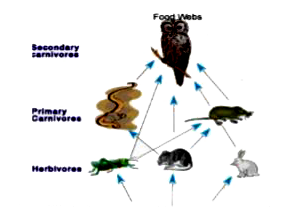
Which of the following limits the number of trophic levels in a food chain?
View SolutionFood chains are very important for the survival of most species. When only one element is removed from the food chain it can result in extinction of a species in some cases. The foundation of the food chain consists of primary producers
Primary producers, or autotrophs, can use either solar energy or chemical energy to create complex organic compounds, whereas species at higher trophic levels cannot and so must consume producers or other life that itself consumes producers. Because the sun's light is necessary for photosynthesis, most life could not exist if the sun disappeared. Even so, it has recently been discovered that there are some forms of life, chemotrophs, that appear to gain all their metabolic energy from chemosythesis driven by hydrothermal vents, thus showing that some life may not require solar energy to thrive.
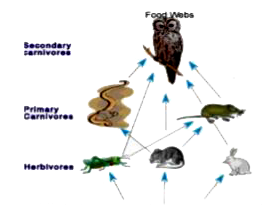
Matter and energy are two fundamental inputs of an ecosystem. Movement of
View Solution
Knowledge Check
Food chains are very important survival of most species.
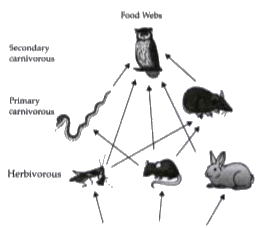
Matter and energy are two fundamental inputs of an ecosystem. Movement ofAEnergy is bidirectionaland matter is repeatedly circulatingBEnergy is repeatedly circulation and matter is unidirectional.CEnergy is unidirectional and matter is repeatedly circulatingDEnergy is multidirectional and matter is bidirectional.
Food chains are very important for the survival of most species. When only one element is removed from the food chain it can result in extinction of a species in some cases. The foundation of the food chain consists of primary producers
Primary producers, or autotrophs, can use either solar energy or chemical energy to create complex organic compounds, whereas species at higher trophic levels cannot and so must consume producers or other life that itself consumes producers. Because the sun's light is necessary for photosynthesis, most life could not exist if the sun disappeared. Even so, it has recently been discovered that there are some forms of life, chemotrophs, that appear to gain all their metabolic energy from chemosythesis driven by hydrothermal vents, thus showing that some life may not require solar energy to thrive.
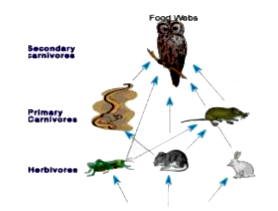
Mr. X is eating curd/yogurt. For this food intake in a food chain he should be considered as occupying
View SolutionFood chains are very important for the survival of most species. When only one element is removed from the food chain it can result in extinction of a species in some cases. The foundation of the food chain consists of primary producers
Primary producers, or autotrophs, can use either solar energy or chemical energy to create complex organic compounds, whereas species at higher trophic levels cannot and so must consume producers or other life that itself consumes producers. Because the sun's light is necessary for photosynthesis, most life could not exist if the sun disappeared. Even so, it has recently been discovered that there are some forms of life, chemotrophs, that appear to gain all their metabolic energy from chemosythesis driven by hydrothermal vents, thus showing that some life may not require solar energy to thrive.
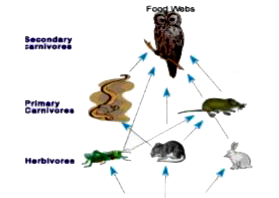
The decomposers are not included in the food chain. The correct reason for the same is because decomposers:
View SolutionFood chains are very important for the survival of most species
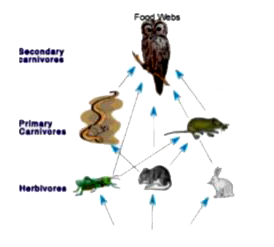
If 10,000 J solar energy falls on green plants in a terrestrial ecosystem, what percentage of solar energy will be converted into food energy?
View SolutionThe food chain consists of producers and __________
View SolutionFood chains are very important for the survival of most species
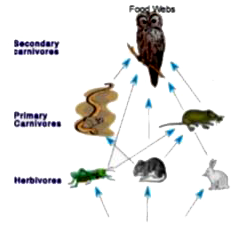
Which of the following limits the number of trophic levels in a food chain?
View SolutionFood chains are very important for the survival of most species
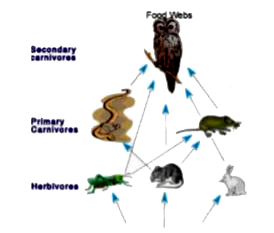
The decomposers are not included in the food chain.The correct reason for the same is because decomposers:
View SolutionFood chains are very important for the survival of most species
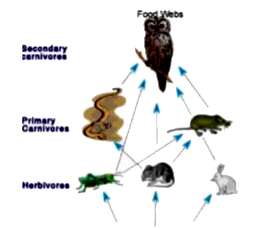
Matter and energy are two fundamental inputs of an ecosystem. Movement of
View Solution
